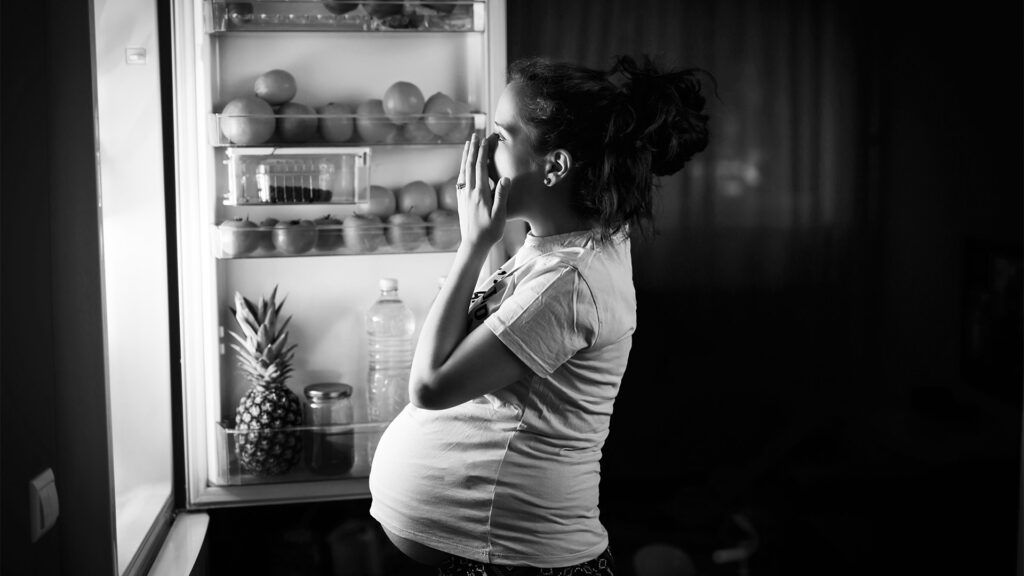Pregnant people may experience cravings for substances that have little to no nutritional value, for example, clay or dirt. Doctors refer to these types of cravings as pica.
The term comes from “pica-pica,” the Latin word for magpie, a bird that notoriously gathers and eats almost anything. Pica is common in childhood, but pregnant people can also experience it. Usually, people with pica consume non-food items for at least one month.
In certain parts of the world, eating non-food stuff is culturally acceptable and may even be the norm. However, some ingested substances can have potentially harmful effects on pregnant people and the fetus.
This article reviews pica in pregnancy and its causes. It also discusses how pregnant people can manage and satisfy their pica cravings.

Pica is considered an eating disorder. Doctors do not currently know the exact cause. However, a combination of factors may lead a pregnant person to experience pica.
During pregnancy, a person may develop pica if they are not getting the nutrients necessary to support both their own and the baby’s needs.
Without nutritional support, a pregnant person may develop nutrient deficiencies. These can include deficiencies in vitamins and minerals. Low levels of iron, zinc, or calcium may
A
The same study found that around 47% of participants had experienced some form of pica during their pregnancy. Ice and white clay were the most commonly consumed non-food items.
However, the researchers note that some people eating clay or ice believed they had nutritional value. Some also found that the scent or taste helped improve nausea.
People with
- clay, sand, or dirt
- ice
- charcoal or ash
- starch
- paint
- metal
- pebbles
- eggshells
- hair
- soap
- baking soda
- coffee grounds
Pica is not always dangerous,
Still, ingestion of certain items can lead to several complications. In some cases, these can put both the health of the baby and the pregnant person at risk. They include:
- lead poisoning due to clay ingestion
- tooth decay and sensitivity
- iron deficiency due to excessive starch or ice ingestion
- high blood sugar or obesity due to excessive starch ingestion
- other types of poisoning due to the ingestion of items containing toxic substances
It is important to address the underlying cause of pica. Sometimes, pica
Over time, pica can cause serious complications, such as:
- infections
- heavy metal toxicity
- bowel obstruction
- poisoning
- ulcers
- bowel perforation
If a pregnant person experiences pica cravings, including ice cravings, they should contact a doctor. The condition is not uncommon and there are several ways people can manage their cravings.
To help manage pica, a doctor may start by reviewing a person’s medical history. They may also order testing, such as blood tests. These can help determine if a person has any nutrient deficiencies or underlying conditions that may be contributing to pica.
In most cases, pica
How to satisfy cravings
Ensuring that a pregnant person’s nutritional needs are being met can help manage pica and reduce the frequency of cravings. A registered dietitian can recommend a dietary plan to support adequate nutrition.
Consuming foods with certain textures can also help reduce pica cravings. Some of these include:
- gum or mints
- crunchy vegetables and fruits, such as celery, carrots, and apples
- protein-rich foods, including beans, nuts, meats, and fish
- foods rich in nutrients, such as hummus, yogurt, and cheese
Ice may also be a good option for occasionally satisfying pica due to its crunchy and fresh texture. However, ice can contribute to tooth decay and sensitivity if used for long periods.
Pica refers to unusual cravings to eat non-food items with little nutritional value. It is more common during childhood and pregnancy.
While doctors are unsure of the exact cause, a combination of factors likely contributes to pica development. Factors such as cultural practices, poor nutrition, and nutrient deficiencies may play a role.
In some cases, pica can lead to complications. These include poisoning, bowel obstruction, and ulcers.
If a pregnant person experiences unusual non-food cravings, they should speak to a doctor. They can help address any underlying causes and check for nutrient deficiencies.
